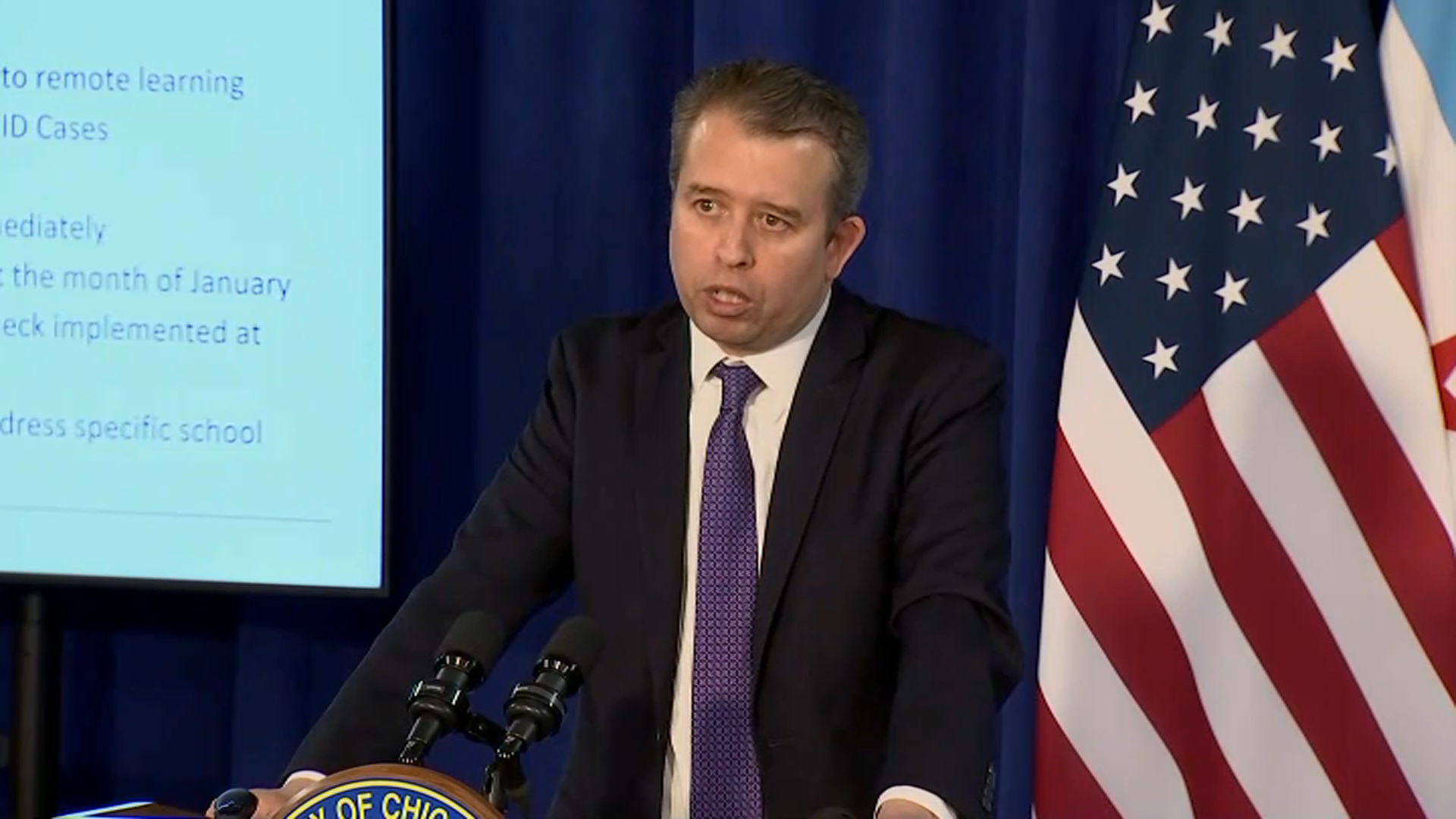The Illinois House of Representatives on Wednesday elected Rep. Emanuel "Chris" Welch as the first Black speaker in the state's history and the chamber's first new leader in decades, marking a seismic shift of power in Springfield, bringing the reign of longtime Speaker Michael Madigan to an end.
"I am grateful and humbled by your friendship, your guidance and your trust," Welch, 49, told colleagues immediately after taking his oath of office.
"While we won't always agree, because of where we come from, I want to ensure that each of my colleagues knows that I want to work with you directly. I extend my hand to you, to you and you so that we can all work together," he continued. "I want to be open and accessible so we can all work together to solve the very serious issues in this state."
Welch, a Democrat from Hillside, received 70 votes to Republican Leader Jim Durkin's 44 votes to win the position. The historic vote makes Welch, who has represented the 7th District since 2013, the first Black speaker of the Illinois House in state history.
"When I came to Springfield last Friday, it was not my ambition to be standing here. I can tell you that," Welch said, in a nod to the surprising turn of events over the previous five days that ended with him assuming the top job. "My ambition was to help my constituents. That was the job that I accepted and am going to continue to do each and every day that I come here - and I ask you to join me in that."
Welch locked up support from the caucus to take over the leadership role just minutes before the members of 102nd General Assembly were set to be sworn in and vote for speaker.
Local
Madigan had served as speaker for all but two years since 1983, making him the longest serving statehouse speaker in U.S. history. The changing of the guard on Wednesday took place on the 50th anniversary of when Madigan was first sworn into office as state representative for the 22nd District on Chicago's Southwest Side.
Many of Madigan's colleagues in the House on both sides of the aisle gave him a standing ovation as he prepared to pass the torch.
"No matter where you stand on the scale of favorability, we must give recognition to whom recognition is due," Rep. Maurice West said to open his remarks nominating Welch. "Out of respect, I ask for a standing ovation for the legacy and service of Speaker Michael J. Madigan."
Welch lauded Madigan in his own speech, saying, "We have to thank and acknowledge that our state would not be where it is today without Speaker Madigan."
"Our schools are better, more children have access to health care and our working class families can more easily live the American dream thanks to Speaker Madigan," Welch continued, noting he had learned from Madigan's "steadfast leadership."
In a statement on Wednesday, Madigan thanked his district and members of his caucus "for the faith and trust" they placed in him over the years, as well as his staff for their work, calling his terms "the honor of a lifetime."
"It is time for new leadership in the House. I wish all the best for Speaker-elect Welch as he begins a historic speakership," Madigan said. "It is my sincere hope today that the caucus I leave to him and to all who will serve alongside him is stronger than when I began. And as I look at the large and diverse Democratic majority we have built—full of young leaders ready to continue moving our state forward, strong women and people of color, and members representing all parts of our state—I am confident Illinois remains in good hands.”
Madigan suspended his campaign for another term as speaker on Monday after he received 51 votes in the full Democratic Caucus' first vote, falling short of the 60 needed.
“As I have said many times in the past, I have always put the best interest of the House Democratic Caucus and our members first," Madigan said Monday. "The House Democratic Caucus can work to find someone, other than me, to get 60 votes for Speaker.”
At least 60 votes are required to win the speakership, with Democrats holding 73 seats to Republicans' 45 in the House.
Once Madigan suspended his reelection effort, members of the Legislative Black Caucus then backed Welch for speaker shortly thereafter in a closed-door meeting Monday night. Welch said Tuesday he was "honored to be called upon" by his colleagues in the caucus.
"This historic moment in Illinois and across the country calls for new representation and unity of democratic beliefs," Welch said. "I want to thank Speaker Madigan for his leadership - it has been a challenging year for us all but I am grateful for his commitment to serving the public."
The Black Caucus members had previously announced their support for Madigan for another term, saying in December that the group felt Madigan - before he suspended his campaign - could help "deliver" on their priorities as the embattled lawmaker faced an uphill battle to retain his post.
Welch ultimately prevailed over a field of five other candidates: Madigan, as well as Reps. Jay Hoffman, Ann Williams, Stephanie Kifowit and Kathy Willis - all of whom ended their campaigns after failing to reach the threshold of support needed in four separate votes the Democratic Caucus took in multiple closed-door meetings ahead of Wednesday's ceremony.
Questions did surface about Welch as his candidacy ascended - some related to his treatment of women. A 2002 Hillside police report says a woman described as Welch's ex-girlfriend told investigators he "grabbed her hair with both hands... and proceeded to slam her head backwards several times on the counter top" during an altercation.
Welch did not respond to questions on the allegation, but according to published reports at the time, Welch denied the incident. No charges were filed in the case. He also reportedly faced a civil lawsuit in 2010 for harassment and retaliation, according to the Chicago Tribune, in a case that was dropped.
Those allegations surfaced as several groups called for the House to elect its first woman speaker - though the only two remaining female candidates dropped out of the race on Tuesday.
Sources said Madigan on Tuesday night had already begun moving items from the desk he's held for nearly 40 years. The end of Madigan's time as speaker was foretold in November, when a total of 19 Democrats in the House announced that they would not support him for another term.
A majority of those 19 members of Madigan's caucus who publicly came out against his reelection effort did so in November after two former ComEd executives and two consultants, one a longtime Madigan associate and confidant, were indicted on multiple federal charges related to the alleged scheme to influence Madigan - identified in the indictment as "Public Official A" - in exchange for legislation favorable to the utility giant, prosecutors say.
Those charges came months after federal prosecutors filed a deferred prosecution agreement with ComEd in which investigators revealed that the utility company agreed to pay $200 million dollars in fines and admitted to arranging jobs and payments for associates of an elected official, referred to only as “Public Official A," from 2011 to 2019 to curry favor with the official.
Madigan has not been charged with any criminal wrongdoing and has repeatedly denied the allegations laid out by prosecutors, saying in part that if the conspiracy to influence him did occur, "it was never made known" to him and if it had been, it "would have been profoundly unwelcome."
As he jockeyed for the speakership, Welch also faced scrutiny for his role on a special House committee convened in August to investigate Madigan and the ComEd allegations. Welch chaired that panel, which voted in December down party lines to close its proceedings without discipline for Madigan - who never testified before the committee.
In its final meeting, Welch said the proceedings of the committee, convened via request from the House Republican Leader Jim Durkin, were in part "a sham show trial" for Durkin to attempt to grab power from Madigan, who Durkin has long assailed.
Durkin swiped at Madigan - who had already left the ceremony - again on Wednesday, saying the longtime, now-former speaker's "legacy leaves broken promises to Illinois taxpayers, a legacy driven by absolute power and control" to protests from some Democrats in the chamber.
"There will be suggestions that our speaker is - and it has been suggested - some people will say that nothing's gonna change. I'm hopeful that it will change, that we will see a new image and a new future for the General Assembly," Durkin continued.
"So Speaker Welch, I would avoid taking hand signals and homing pigeons from the 13th Ward," Durkin said to Welch, in reference to the ward where Madigan lives and serves as the Democratic committeeman. Welch reacted by glancing at his Democratic colleagues and slightly shaking his head.
While Wednesday's proceedings marked a massive and historic shift in power, questions still swirled over Madigan's role in the legislature - will he remain in the House for his full term? Will he be a member of Democratic leadership? How much sway might he have with Welch as the new speaker navigates the role?
Madigan also remains the 13th Ward Democratic committeeman as well as the chair of the Democratic Party of Illinois, which he - a prodigious fundraiser - has long used to protect his majority in the House. Will he continue in those roles?
Another issue soon to arise: this year, following the 2020 census, the legislature is tasked with redistricting - a task Madigan has helmed, redrawing maps of congressional and legislative districts. Will he still oversee or be part of that process?
That all remains to be seen, and while many questions were left unanswered in Wednesday's vote, the day's events certainly marked the end of an era in Illinois.



